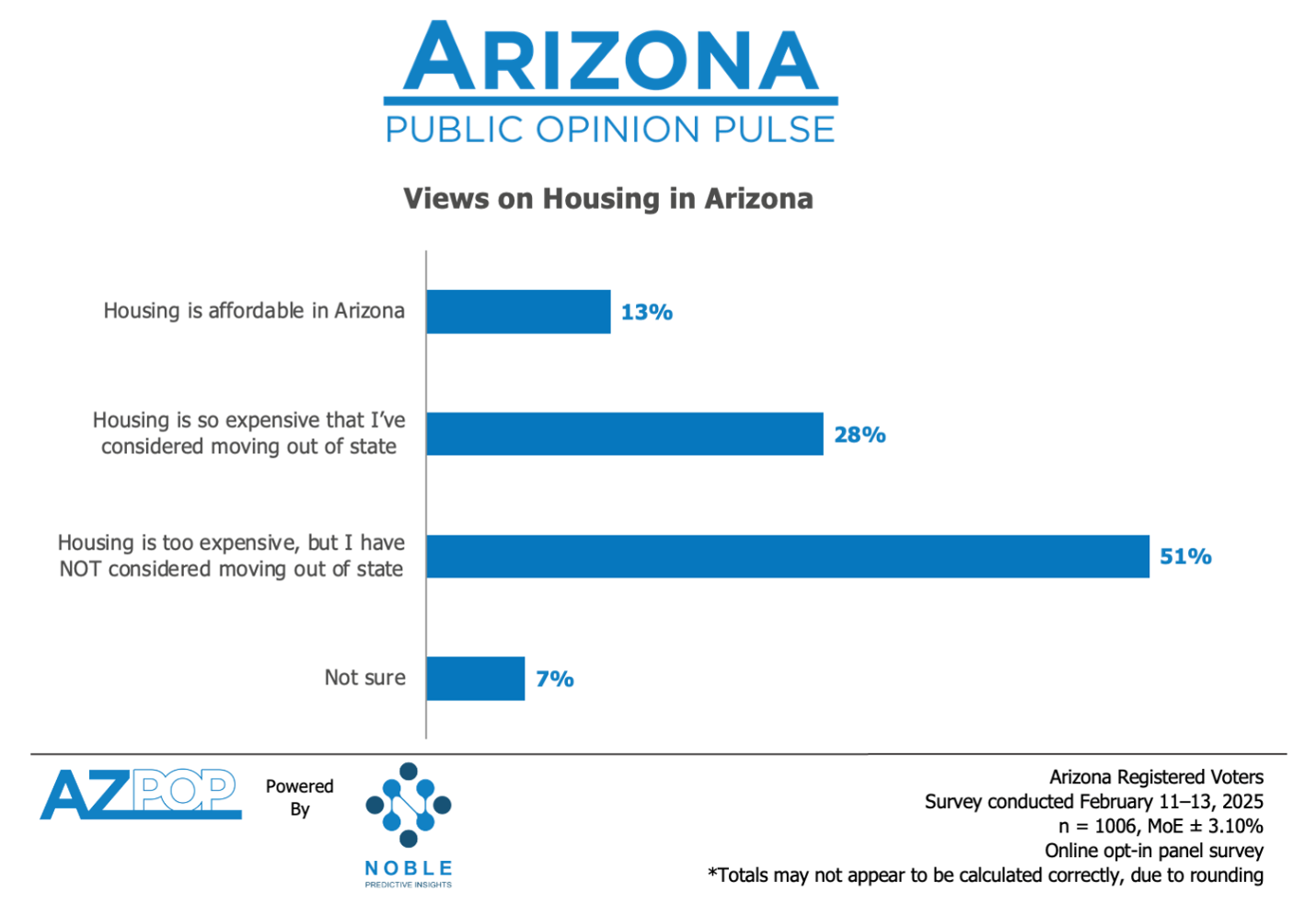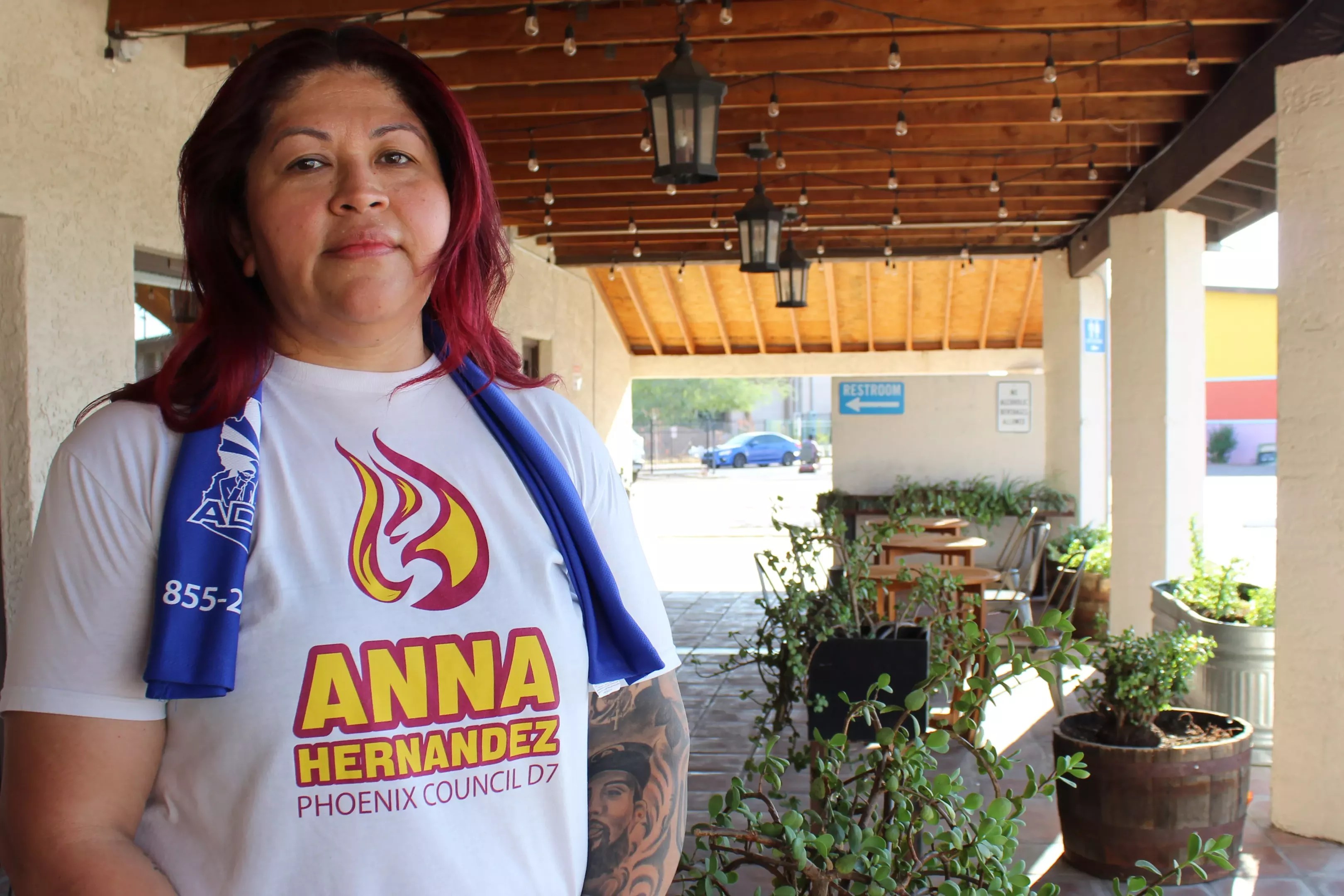
Mario Tama/Getty Images

Audio By Carbonatix
Exploding housing costs are stressing Arizonans out, and according to a poll released on Mar. 4, many are thinking about getting out of Dodge.
In a survey of 1,006 registered voters in the state conducted by Noble Predictive Insights, 28% said they “have seriously considered leaving Arizona due to housing prices.” The survey also shows that 40% of respondents ranked affordable housing among their top three concerns. Only 13% said housing in Arizona is affordable.

Noble Predictive Insights
Per the poll, which was conducted from Feb. 11-13, the most likely demographics to leave the state due to housing costs are:
- People ages 19-44 (39%)
- Hispanic/Latinos (38%)
- People born and raised in Arizona (35%)
“Over the past four years, home prices have jumped 40%, and rents have increased 50-70% in some areas,” state Rep. Sarah Liguori told Phoenix New Times. “Meanwhile wages have lagged, and those on fixed income have been hit the hardest. More and more people statewide are paying over a third of their income on rent.”
A March 2024 study from Arizona State University found it takes a salary of $123,752 to afford the median home price in Phoenix – out of reach for lots of middle-class workers like nurses, teachers, police officers, firefighters and construction workers. Since then, rent has increased substantially in at least eight major cities across the state.
Liguori, who is co-chair of the Arizona Legislature’s bipartisan housing and homelessness caucus, also noted that Maricopa County saw a record-breaking number of evictions last year.

Phoenix City Councilmember-elect Anna Hernandez said private equity firms can take advantage of Arizona’s housing market because the state has not built enough units to keep up with demand.
TJ L’Heureux
‘A perfect storm’
How did it get so bad?
Liguori rattled off a number of factors: high migration rates, low housing stock, investors buying homes, the abundance of short-term rentals, the high costs of land and materials, and an abundance of regulations.
“At its core, this comes down to an economic imbalance,” she said. “Housing supply can’t keep up with demand, and wages aren’t rising fast enough to match housing costs.”
Most experts agree that there is simply not enough housing in the state. According to a report from Arizona State University’s Morrison Institute, the state is short 270,000 units.
Nolan Williams, president and founder of the affordable housing advocacy group Tempe YIMBY, said Arizona’s job and population growth, plus its relative affordability compared to cities on the coasts, draws more than 300 new residents to the state each day. Housing construction has not kept up.
“That’s equivalent to a new downtown high rise every couple days,” Williams said. “But we are not building a new downtown high-rise every couple of days.”
Building more units often isn’t easy for developers. Former state Sen. Anna Hernandez, who will assume a seat on the Phoenix City Council next month, said “unnecessary zoning regulations” are an impediment to building more units.
More nefarious forces drive prices up, too. A year ago, Arizona Attorney General Kris Mayes launched a lawsuit against several major apartment landlords – who collectively own 70% of rentals in the Valley and 50% in Tucson – for allegedly using algorithmic software to price gouge renters. On Tuesday, Mayes sent a letter to U.S. Attorney General Pam Bondi, urging the U.S. Department of Justice to continue its antitrust lawsuit against real estate software company RealPage.
“Millions of renters – including many in Arizona’s two largest cities – have been harmed by this unlawful conduct. This scheme stifled competition, created a de facto rental monopoly, and drove up housing costs for working families,” Mayes said in the letter. “This is a national crisis.”
Liguori agreed that corporate homeowners and landlords exacerbated the housing crisis. “Housing scarcity and market forces keep prices high, but private equity and greed only make things worse by exploiting the situation,” Liguori said. But Hernandez sees greedy corporate landlords as a symptom, not the cause.
“We know that private equity firms have focused on shoring up our limited housing supply in states like Arizona that help drive up costs,” Hernandez said. “They are able to do that because we have not kept pace on building to match our growth.”

For the second year in a row, a bipartisan housing bill may land on the desk of Gov. Katie Hobbs. She vetoed one last year and has proposed her own housing plan this year.
Matt Hennie
Possible solutions
On its face, the solution is simple: Build more homes.
Hernandez sponsored various affordable housing measures in the Arizona Senate and made housing a centerpiece in her triumphant City Council campaign. She said it was important to not only more housing units but also a wider range of them.
She wants more starter homes, townhomes and duplexes, and fewer zoning restrictions to prevent such units from being built.
“While we work towards guardrails to managing corporate ownership, it is critical we use all the tools at our disposal to build more homes that are attainable to all Arizonans,” Hernandez said.
Liguori told New Times that addressing the housing crisis will require a multifaceted approach, which should include expanding the Low Income Housing Tax Credit and investing more in the state’s Housing Trust Fund. But mainly, it’s about building more units.
Williams echoed that.
“The housing crisis isn’t a temporary bubble created by speculative investors. It’s a chronic shortage,” Williams said. “And the only way out of a shortage is by building more – much more.”
One major effort to address the issue is already making its way through the legislature. Last week, the Arizona Senate passed Senate Bill 1229 – also known as the Starter Homes Act – in a 16-13 vote. The bill was sponsored by Republican state Sen. Shawnna Bolick and had support from lawmakers on both sides of the aisle.
If it becomes law, it would tamp down on local regulation of home-building and prevent cities from rejecting housing proposals for reasons like aesthetic designs, which lawmakers hope will allow for more new, affordable homes. Some opponents, like Democratic state Sen. Mitzi Epstein, believe it gives too much power to developers and takes too much from cities.
A similar bill passed both chambers last year but was vetoed by Gov. Katie Hobbs, who cited concerns from the U.S. Department of Defense. The new version of the bill has been altered to address some of those concerns, though that doesn’t mean it’s a lock to pass. Hobbs has put out her own housing proposal that both dovetails with and diverges from the Starter Homes Act.
What’s clear is that Arizonans want more housing and they’re not being picky about it.
In the Noble Predictive Insights poll, respondents were asked if they would support a new apartment complex being built near them if it would lower housing costs. That kind of question historically has raised NIMBYish responses – that stands for “not in my backyard” – but Arizonans seem to be in a YIMBY mood.
Nearly 60% of respondents said they’d support the construction of a new apartment complex, while only 25% said they’d oppose it.
That support “contradicts the usual ‘not in my backyard’ narrative,” wrote pollster Mike Noble, “and signals that residents recognize new construction as essential to addressing the affordability crisis.”